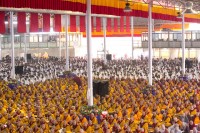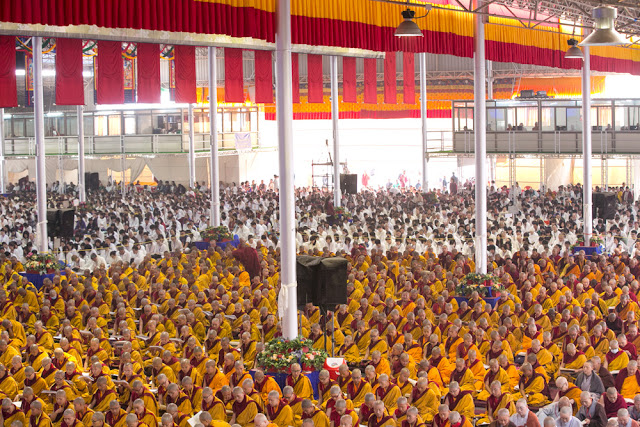法王新闻 | 2016年02月
『33rd噶舉祈願法會』法王開示《三蘊經》(又稱〈三十五佛懺悔文〉)
『33rdKagyu Monlam』Teachings on the Sutra in Three Sections
བློ་སྦྱོང་ཆིག་ལབ་རིང་མོའི་བཀའ་ཁྲིད།

時間:2016年02月16日上午 16 Feb., 2016 6:00-8:30
地點:印度 菩提迦耶 大祈願會場 Monlam Pavilion, Bodhgaya, India
Uploaded on 2024-01-06
念誦《三蘊經》,即圓滿一切懺悔
今天是第33 屆噶舉大祈願法會第一天,祈願會場壇城上金色大佛像兩側,安置以16位法王行誼為主的四座主供養多瑪,下方平台是以白色薔薇、白色萬壽菊及蘭花鋪陳、中有金色世尊像的四方壇城,再前方為木製東方飛簷式、綴以鮮黃及豔紫蘭花的浴佛壇城。
三主壇城之前方,即為法王的主法法座,而從法王所坐之處往下眺望,在僧團的黃紅袍海之後,是整片在家居士的白衣波浪。
今年祈願法會適逢藏曆新年殊勝月,因此法王於去年年底,特別發佈指示,希望參加「八關齋戒」的弟子們,能依據古法換穿白衣,而六千位各國來參加的在家弟子們,幾乎全數遵囑,在灰塵飛揚、豔陽如仲夏的印度,依循兩千多年來佛教在家弟子穿白衣的足跡,換穿上純淨的白衣,如同世間熱浪中的一抹清涼。
The 33rd Monlam Begins in Bodhgaya
Before dawn, thousands of nuns, monks and laypeople filed through the security checks into the Monlam Pavillion for the first day of the 33rd International Kagyu Monlam. All those who walked along the road passed under a simple welcome gate. Made from cloth and plywood mounted on a wooden frame and painted in a pinkish sandstone colour, the gate is designed to be a fusion of temple traditions rather than one particular style. Below its lintel, multi-coloured prayer flags display the dhayani mantra of Akshobhya Buddha, which has the power to purify all those who pass beneath. A large sign declares “Welcome” in Tibetan.
While people were gathering in the pavillion, HE Jamgon Kongtrul Rinpoche visited the Mahabodhi Stupa in order to make offerings to the Golden Buddha on behalf of the Karmapa, to create auspiciousness for the Monlam.
Shortly after 6.00am, His Holiness the 17th Karmapa arrived at the pavillion to bestow the Mahayana Soljong vows. He sat on stage facing the congregation and asked everyone to take the vows with the pure motivation that they were taking them for the sake of all sentient beings. After the vows, he spent a little time clarifying the eight precepts that accompany them. He explained that monastics and laypeople who hold vows should take the Mahayana Soljong vows with the resolve of bodhichitta and pay careful attention to keeping them. He then gave some advice on how to interpret them. For instance, the prohibition against using high seats, designated as above a cubit in height, does not extend to people staying in hotels where there is no choice over where they sleep. In that case it was not necessary to sleep on the floor in order to keep the Soljong vows. Likewise, those who have diabetes or need to take medicine with food and so forth, are excused from keeping the vow which restricts eating to before noon. On the other hand, abstaining from sexual activity is an absolute, and the correct interpretation of the ban on perfumes, necklaces, song and dance concerns avoiding the things we do in order to enhance our attractiveness to others.
■珍惜聖地修持因緣,每天都不要浪費
法王為大眾傳授〈大乘菩薩律儀〉後,接下來講說學處及注意事項,法王特別提醒:
The Soljong finished as the sky lightened over the first day of the 33rd Kagyu Monlam. His Holiness continued his address.
今天是第33屆噶舉大祈願法會正行第一天,來自40多個國家的法友們,一同在菩提迦耶這個對佛教徒最重要的聖地,相聚在一堂,一同為世界和平、眾生喜悅而發出善願,我覺得這是至為難得的。
We are beginning the 33rd Kagyu Monlam today. People have gathered from 40 countries and many different language groups. We shall be making prayers together for the sake of world peace and the happiness of all sentient beings. We are very fortunate…
尤其現在看到世界上有各種戰亂及紛爭,相比之下,我們今天能來在這裡,且身體健康、心情輕鬆地投入修持中,讓自己人生更有意義,這樣的機會是非常稀有的。要知道這非常不容易,要把握這麼難得的機會好好修持,不要浪費每一天。
there are many areas in the world where there is war and conflict, but here we are at ease. It is extremely beneficial to be here; we should recognise our good fortune and remember how rare it is to achieve this opportunity…
祈願法會每年也僅主持一次,就如同一年的總結,你也可以趁此法會期間,去好好思維:哪些事情是有意義的?哪些做得還不夠好、需要改進的?總之帶著這樣向法的心,這是最重要的。對於不好的事,要以「知道不好、決心改進」的懺悔之心,去好好反省改進;對做得好的事,來年要繼續行持。
As Kagyu Monlam is an annual event, he explained, it affords us a unique chance to take stock of the year which has just gone. We can make the aspiration to continue doing the good things we have done and we can generate real remorse for our mistakes and misdeeds, and resolve not to do them again.
因此,祈願法會就是這樣的好機會,讓大家靜下來好好反省自己,我也希望透過祈願法會,讓每個參與的人,都找到人生的意義,能夠得到一些利益。
■感恩信施,勸諭僧眾注重言行修持
尤其是有許多僧眾來參與法會,大家來自不同寺院,據我所知有六百多個,今年屬於噶舉派傳承僧眾也有將近三千人,法會當中,可以說我們受用的衣服、飲食等一切資具、一切供養,都來自於具備信心的施主、功德主,他們都是為生、亡兩者的祈福用意而做此供養,希望僧眾在祈願法會期間,僧眾也能更加重視言行。
He then turned his attention to the monks and nuns and warned them to keep a pure motivation and fulfil their responsibilities. Out in the world, he said, people work and then they get paid.
希望大家都知道,這裡所供養的每一分錢,都是得來不易,有時我們都未能善加思維到說,此處的每一分錢,都是上班者辛苦工作才賺來的,因此若大家吃飽飽的,什麼都不做,我覺得這可是「偷盜」當中,最大的、如同強盜一般的偷竊。
But sometimes it seems as if monastics don’t do this. It is as if we have become the biggest thieves and robbers in the world. The offerings that people give us do not fall from the sky, so we should do the work…even if we only recite a single word of prayer…
這一切供養都不是從天上掉下來,每一分錢都是施主們每天辛勤工作而賺得的,因此,希望僧眾們在法會期間請做好自己事情,就算僅是好好念誦一句經文,也希望大家專注且善巧的隨文發願、觀想,做好自己分內之事。
若能如此克盡本分,就不會有「信施難消」問題,不然若只是來此拿供養、吃吃喝喝,作自己想做之事的話,那你就會信施難消,對整個祈願法會而言也並非好事。
The purpose of becoming a monk or a nun is not to have good food and clothing or to become popular but to spread the Buddha’s teachings.
其實,各種飲食衣服都是我們生存所需,人活著都需要飲食、衣服,沒有人會告訴你不需這些,但人生目的,不應該只為了更好的衣服或食物,感覺這不是我們的用意,最重要的是:要讓人生有意義,讓佛法修行能夠入心,更加利益眾生、弘揚佛教,要有這樣發心是很重要的。
當然,人生在世,也無法不吃不喝、穿破爛衣服,我也不會強求各位這麼做,但祈願法會期間,請善加持守規矩,僧團也會有糾察師照看。對於這些規矩,也希望大家不要感覺有壓力,不僅是為了傳統而守規矩,更是發自內心的去歡喜行持,而且現場有很多從世界各地遠道而來的在家眾,所以規矩很重要,希望大家善加持守。
We can’t all be like Milarepa and give up food and clothing…but keep in mind your responsibilities. The monastic codes aren’t just something to be done, but something to be done enthusiastically. Similarly, householders, should always remember the precepts, maintain good behaviour and not commit any harm.
■《三蘊經》,淨除罪業最主要的修持
其後,法王簡短開示《三蘊經》:
Finally, before the Sutra in Three Sections was recited,
接下來簡單介紹《三蘊經》,這是出自於《大寶積經》〈第二十四優婆離會〉,是佛陀在舍衛國祇樹給孤獨園,與大比丘眾千二百五十人俱,菩薩摩訶薩五十萬人時所說。
His Holiness gave a short explanation. The sutra comes from the 22nd section of the Ratnaguta Sutra which was taught by the Lord Buddha at Shravasti in the presence of 500 arhats and 1000 bodhisattvas.
對於《三蘊經》的「三」,有幾種說法:
一,懺悔、隨喜、迴向:這是比較出名的說法。
二,懺悔、行善、祈請:這是另外的說法。
三,禮拜、懺悔、迴向:這是最普遍的說法。今天我們講解,也會採取這個說法:
There were different interpretations of the three sections but the most common view was that the three sections were prostration, confession, and dedication.
1. 禮拜蘊:所謂「頂禮、禮拜」的「蘊」,是自「南無如來應供正遍知釋迦牟尼佛」開始,到「南無寶蓮花妙住山王佛」。
2. 懺悔蘊:「頂禮蘊」之後,中間一段從「如是等十方」到「復願諸佛世尊攝受護念證明於我」,是屬於「懺悔」部分。
3. 迴向蘊:最後一段是「迴向」,是從「若我今生或復餘生」到文末。
這就是《三蘊經》的三部分:禮拜、懺悔、迴向。文初則先皈依佛、皈依法、皈依僧,皈依的目的,是為了憶念三寶的功德。
The sutra began with refuge prayers so that we would remember the qualities of the Three Jewels.
念誦時,也有兩種傳統:
一,於每尊佛前加「如來」:那洛巴大師認為需要加上「如來」,宗喀巴大師也是持相同看法。(註:本次中文念誦的是漢傳版唐朝般若法師譯《三蘊經》,則未在每尊佛前加「如來」)
There was a method, described by Naropa and Tsongkhapa, of including the names of the buddhas in the section on confession.
二,不於每佛前加「如來」:例如第八世法王噶瑪巴於《百段引導文中》曾引述《三蘊經》,即未於每尊佛前加「如來」。
《三蘊經》和〈普賢行願品〉,每個修行人都應該當成最主要的修持。尤其對於「淨除罪業」而言,當戒律上有所違犯時,都能透過念誦《三蘊經》,而得到淨除。這也就是為什麼我們會說,若一個行者懂得如何修持的話,就會瞭解到,僅是念誦《三蘊經》,就能圓滿一切的懺悔。
This was used by the bodhisattvas as the main practice on the path, and was particularly important for confessing downfalls of their bodhisattva vows. If we know how to practise this sutra correctly, all the practices are complete within these three sections, and the sutra has the power to bring us all the way to the state of perfect enlightenment.
希望大家在知道它的重要性後,善加念誦。接著我們來念誦又稱〈三十五佛懺悔文〉的《三蘊經》:
禮拜蘊
སེམས་ཅན་ཐམས་ཅད་བླ་མ་་ལ་སྐྱབས་སུ་མཆིའོ། །སངས་རྒྱས་ལ་སྐྱབས་སུ་མཆིའོ། །ཆོས་ལ་སྐྱབས་སུ་མཆིའོ། །དགེ་འདུན་ལ་སྐྱབས་སུ་མཆིའོ།
All sentient beings refuge to the guru, refuge to the Buddhas, refuge to the Dharma, and refuge to the Sangha.
一切有情恒常皈依上師尊,皈依佛,皈依法,皈依僧。
དེ་བཞིན་གཤེགས་པ་དགྲ་བཅོམ་པ་ཡང་དག་པར་རྫོགས་པའི་སངས་རྒྱས་ཤཱཀྱ་ཐུབ་པ་ལ་ཕྱག་འཚལ་ལོ།
I prostrate to the tathagata arhat completely perfect Buddha Shakyamuni.
頂禮薄伽梵,如來,阿羅漢,正等正覺,釋迦能仁,(南無如來應供正遍知釋迦牟尼佛,)
སངས་རྒྱས་རྡོ་རྗེ་སྙིང་པོས་རབ་ཏུ་འཇོམས་པ་ལ་ཕྱག་འཚལ་ལོ།
I prostrate to Conquers with Vajragarbha Buddha.
頂禮金剛精華摧破佛,(「南無金剛不壞佛」)
སངས་རྒྱས་རིན་ཆེན་འོད་འཕྲོ་ལ་ཕྱག་འཚལ་ལོ།
I prostrate to Precious Radiant Light Buddha.
頂禮珍寶光芒佛(「南無寶光佛」)
སངས་རྒྱས་ཀླུ་དབང་གི་རྒྱལ་པོ་ལ་ཕྱག་འཚལ་ལོ།
I prostrate to King of Naga Rulers Buddha.
頂禮自在龍王佛(「南無龍尊王佛」)
སངས་རྒྱས་དཔའ་བོའི་སྡེ་ལ་ཕྱག་འཚལ་ལོ།
I prostrate to Virasena Buddha.
頂禮勇猛部眾佛(「南無精進軍佛」)
སངས་རྒྱས་དཔལ་དགྱེས་ལ་ཕྱག་འཚལ་ལོ།
I prostrate to Glorious Joy Buddha.
頂禮吉祥喜佛(「南無精進喜佛」)
སངས་རྒྱས་རིན་ཆེན་མེ་ལ་ཕྱག་འཚལ་ལོ།
I prostrate to Precious Fire Buddha.
頂禮寶火焰佛(「南無寶火佛」)
སངས་རྒྱས་རིན་ཆེན་ཟླ་འོད་ལ་ཕྱག་འཚལ་ལོ།
I prostrate to Precious Moonlight Buddha.
頂禮珍寶月光佛(「南無寶月光佛」)
སངས་རྒྱས་མཐོང་བ་དོན་ཡོད་ལ་ཕྱག་འཚལ་ལོ།(Bamboo注:མཐོང་བ་དོན་ཡོད་是“见而有益”的意思)
I prostrate to Meaningful to See Buddha.
頂禮見不空佛(「南無現無愚佛」)
སངས་རྒྱས་རིན་ཆེན་ཟླ་བ་ལ་ཕྱག་འཚལ་ལོ།
I prostrate to Precious Moon Buddha.
頂禮珍寶月佛(「南無寶月佛」)
སངས་རྒྱས་དྲི་མ་མེད་པ་ལ་ཕྱག་འཚལ་ལོ།
I prostrate to Vimala Buddha.
頂禮無垢佛(「南無無垢佛」)
སངས་རྒྱས་དཔལ་བྱིན་ལ་ཕྱག་འཚལ་ལོ།
I prostrate to Viradatta Buddha.
頂禮福德佈施佛(「南無勇施佛」)
སངས་རྒྱས་ཚངས་པ་ལ་ཕྱག་འཚལ་ལོ།
I prostrate to Brahma Buddha.
頂禮梵天清淨佛(「南無清淨佛」)
སངས་རྒྱས་ཚངས་པས་བྱིན་ལ་ཕྱག་འཚལ་ལོ།
I prostrate to Brahmadatta Buddha.
頂禮梵天清淨施佛(「南無清淨施佛」)
སངས་རྒྱས་ཆུ་ལྷ་ལ་ཕྱག་འཚལ་ལོ།
I prostrate to Water Deva Buddha.
頂禮水天佛(「南無娑留那」)
སངས་རྒྱས་ཆུ་ལྷའི་ལྷ་ལ་ཕྱག་འཚལ་ལོ།
I prostrate to Deva of Water Devas Buddha.
頂禮水天之天佛(「南無水天佛」)
སངས་རྒྱས་དཔལ་བཟང་ལ་ཕྱག་འཚལ་ལོ།
I prostrate to Glorious Goodness Buddha.
頂禮賢德佛(「南無堅德佛」)
སངས་རྒྱས་ན་དན་དཔལ་ལ་ཕྱག་འཚལ་ལོ།
I prostrate to Glorious Sandalwood Buddha.
頂禮旃檀德佛(「南無旃檀功德佛」)
སངས་རྒྱས་གཟི་བརྗིད་མཐའ་ཡས་ལ་ཕྱག་འཚལ་ལོ།
I prostrate to Boundless Splendor Buddha.
頂禮無量威光佛(「南無無量掬光佛」)
སངས་རྒྱས་འོད་དཔལ་ལ་ཕྱག་འཚལ་ལོ།
I prostrate to Glorious Light Buddha.
頂禮光德佛(「南無光德佛」)
སངས་རྒྱས་མྱ་ངན་མེད་པའི་དཔལ་ལ་ཕྱག་འཚལ་ལོ།
I prostrate to Glorious Ashoka Buddha.
頂禮無憂德佛(「南無無憂德佛」)
སངས་རྒྱས་སྲེད་མེད་ཀྱི་བུ་ལ་ཕྱག་འཚལ་ལོ།
I prostrate to Narayana Buddha.
頂禮無欲童子佛(「南無那羅延佛」)
སངས་རྒྱས་མེ་ཏོག་དཔལ་ལ་ཕྱག་འཚལ་ལོ།
I prostrate to Glorious Flower Buddha.
頂禮功德花佛(「南無功德華佛」)
དེ་བཞིན་གཤེགས་པ་ཚངས་པའི་འོད་ཟེར་རྣམ་པར་རོལ་པ་མངོན་པར་མཁྱེན་པ་ལ་ཕྱག་འཚལ་ལོ།
I prostrate to the tathagata Manifest Wisdom Display of Brahma’s Light-Rays.
頂禮如來梵光遊戲神通佛(「南無清淨光遊戲神通佛」)
དེ་བཞིན་གཤེགས་པ་པདྨའི་འོད་ཟེར་རྣམ་པར་རོལ་པ་མངོན་པར་མཁྱེན་པ་ལ་ཕྱག་འཚལ་ལོ།
I prostrate to the tathagata Manifest Wisdom Display of Lotus Light-Rays.
頂禮如來蓮花光遊戲神通佛(「南無蓮華光遊戲神通佛」)
སངས་རྒྱས་ནོར་དཔལ་ལ་ཕྱག་འཚལ་ལོ།
I prostrate to Glorious Wealth Buddha
頂禮財德佛(「南無財功德佛」)
སངས་རྒྱས་དྲན་པའི་དཔལ་ལ་ཕྱག་འཚལ་ལོ།
I prostrate to Glorious Recollection Buddha.
頂禮德念佛(「南無德念佛」)
སངས་རྒྱས་མཚན་དཔལ་ཤིན་ཏུ་ཡོངས་གྲགས་ལ་ཕྱག་འཚལ་ལོ།
I prostrate to Utterly Renowned Glorious Name Buddha.
頂禮德號遍譽佛(「南無善名稱功德佛」)
སངས་རྒྱས་དབང་པོ་ཏོག་གི་རྒྱལ་མཚན་གྱི་རྒྱལ་པོ་ལ་ཕྱག་འཚལ་ལོ།
I prostrate to King of the Peak of the Victory Banner of Powers Buddha.
頂禮帝釋最勝幢佛(「南無紅炎幢王佛」)
སངས་རྒྱས་ན་ཏུ་རྣམ་པར་གནོན་པའི་དཔལ་ལ་ཕྱག་འཚལ་ལོ།
I prostrate to Glorious Total Overcomer Buddha.
頂禮極善馭德佛(「南無善遊步功德佛」)
སངས་རྒྱས་གཡུལ་ལས་ཤིན་ཏུ་རྣམ་པར་རྒྱལ་བ་ལ་ཕྱག་འཚལ་ལོ།
I prostrate to Utterly Victorious over Warfare Buddha.
頂禮戰勝佛(「南無闘戰勝佛」)
སངས་རྒྱས་རྣམ་པར་གནོན་པས་གཤེགས་པ་ལ་ཕྱག་འཚལ་ལོ།
I prostrate to Goes by Overcoming Buddha.
頂禮善馭德佛(「南無善遊步佛」)
སངས་རྒྱས་ཀུན་ནས་སྣང་བ་བཀོད་པའི་དཔལ་ལ་ཕྱག་འཚལ་ལོ།
I prostrate to Glorious Array of Ubiquitous Light Buddha.
頂禮普相莊嚴德佛(「南無周匝莊嚴功德佛」)
སངས་རྒྱས་རིན་ཆེན་པདྨས་རྣམ་པར་གནོན་པ་ལ་ཕྱག་འཚལ་ལོ།
I prostrate to Precious Lotus who Overcomes Buddha.
頂禮寶蓮花馭佛(「南無寶華遊步佛」)
དེ་བཞིན་གཤེགས་པ་དགྲ་བཅོམ་པ་ཡང་དག་པར་རྫོགས་པའི་སངས་རྒྱས་རིན་པོ་ཆེའི་པདྨ་ལ་རབ་ཏུ་བཞུགས་པ་རི་དབང་གི་རྒྱལ་པོ་ལ་ཕྱག་འཚལ་ལོ།
I prostrate to the tathagata arhat completely perfect buddha King among Lords of Mountains Who Abides on a Precious Lotus.
頂禮如來,阿羅漢,正等正覺,寶蓮花善住須彌山王佛。(「南無寶蓮華善住娑羅樹王佛」)
懺悔蘊
དེ་དག་ལ་སོགས་པ་ཕྱོགས་བཅུའི་འཇིག་རྟེན་གྱི་ཁམས་ཐམས་ཅད་ན་
You, and all the tathagata arhat completely perfect buddhas
彼等十方世界
དེ་བཞིན་གཤེགས་པ་དགྲ་བཅོམ་པ་ཡང་དག་པར་རྫོགས་པའི་སངས་རྒྱས་བཅོམ་ལྡན་འདས་
who abide in the world-realms in the ten directions,
所有一切如來,阿羅漢,正等正覺,薄伽梵,
གང་ཇི་སྙེད་ཅིག་བཞུགས་ཏེ་འཚོ་ཞིང་གཞེས་པའི་སངས་རྒྱས་བཅོམ་ལྡན་འདས་དེ་དག་ཐམས་ཅད་བདག་ལ་དགོངས་སུ་གསོལ།
as many as you may be: all you bhagavan buddhas, I pray that you consider me.
盡所有住世者,彼等一切佛陀薄伽梵祈護念:
བདག་གིས་སྐྱེ་བ་འདི་དང༌། སྐྱེ་བ་ཐོག་མ་དང་མཐའ་མ་མ་མཆིས་པ་ནས།
I admit all the wrongdoing I have committed in this birth, in other births,
若我此世,若我前世,
འཁོར་བ་ན་འཁོར་བའི་སྐྱེ་བ་གཞན་དག་ཏུ་སྡིག་པའི་ལས་བགྱིས་པ་དང༌།
and throughout my beginningless births while circling in samsara;
從無始以來,於輪迴中一切輪迴生處,
བགྱིད་དུ་སྩལ་བ་དང༌། བགྱིས་པ་ལ་རྗེས་སུ་ཡི་རང་བའམ།
wrongdoing committed by me, as well as the encouragement of wrongdoing, and rejoicing in wrongdoing;
自做罪業,若教他做,見做隨喜,
མཆོད་རྟེན་གྱི་དཀོར་རམ། དགེ་འདུན་གྱི་དཀོར་རམ། ཕྱོགས་བཞིའི་དགེ་འདུན་གྱི་དཀོར་ཕྲོགས་པ་དང༌།
including theft of the wealth of stupas, theft of the wealth of sanghas, or of the wealth of the sanghas in the four directions,
塔財,僧財,十方僧財,
འཕྲོག་ཏུ་སྩལ་པའམ། འཕྲོག་པ་ལ་རྗེས་སུ་ཡི་རང་བའམ།
the encouragement of such theft, and rejoicing in such theft;
若自取,若教他取,見取隨喜,
མཚམས་མ་མཆིས་པ་ལྔའི་ལས་བགྱིས་པ་དང༌། བགྱིད་དུ་སྩལ་བ་དང༌། བགྱིས་པ་ལ་རྗེས་སུ་ཡི་རང་བའམ།
as well as the commission of the five worst actions, the encouragement of such actions, and rejoicing in such actions;
五無間業,若自做,若教他做,見做隨喜,
མི་དགེ་བ་བཅུའི་ལས་ཀྱི་ལམ་ཡང་དག་པར་བླང་བ་ལ་ཞུགས་པ་དང༌།
as well as entrance into the full acceptance of the path of the ten unvirtuous actions,
⼗不善業道,
འཇུག་ཏུ་སྩལ་བ་དང༌། འཇུག་པ་ལ་རྗེས་སུ་ཡི་རང་བའམ།
the encouragement of such entrance, and rejoicing in such entrance;
若自做,若教他做,見做隨喜,
ལས་ཀྱི་སྒྲིབ་པ་གང་གིས་བསྒྲིབས་ནས།
also whatever actions will, through their obscuration,
業障所障,
བདག་སེམས་ཅན་དམྱལ་བར་མཆི་བའམ། དུད་འགྲོའི་སྐྱེ་གནས་སུ་མཆི་བའམ།
cause migration to hell, migration to birth as an animal,
我等有情應墮地獄,墮畜生趣,
ཡི་དྭགས་ཀྱི་ཡུལ་དུ་མཆི་བའམ། ཡུལ་མཐའ་འཁོབ་ཏུ་སྐྱེ་བའམ།
migration to the realms of hungry ghosts, birth in a borderland,
墮餓鬼趣,生邊地,
ཀླ་ཀློར་སྐྱེ་བའམ། ལྷ་ཚེ་རིང་པོ་རྣམས་སུ་སྐྱེ་བའམ།
birth as a barbarian, birth among long-lived gods,
生蔑戾車,生長壽天,
དབང་པོ་མ་ཚང་བར་འགྱུར་བའམ། ལྟ་བ་ལོག་པར་འཛིན་པར་འགྱུར་བའམ།
with incomplete faculties, the holding of wrong views,
諸根不具,偏執邪見,
སངས་རྒྱས་འབྱུང་བ་ལ་མཉེས་པར་མི་བགྱིད་པར་འགྱུར་བའི་ལས་ཀྱི་སྒྲིབ་པ་གང་ལགས་པ་
or birth in a place to which no buddha will come.
值佛出世不喜,
དེ་དག་ཐམས་ཅད་སངས་རྒྱས་བཅོམ་ལྡན་འདས་ཡེ་ཤེས་སུ་གྱུར་པ།
In the presence of the bhagavan buddhas, who have pristine wisdom,
凡諸彼等一切罪業,以諸佛薄伽梵為智,
སྤྱན་དུ་གྱུར་པ། དཔང་དུ་གྱུར་པ། ཚད་མར་གྱུར་པ།
who have eyes, who are witnesses, who are impeccable,
為眼,為證,為量
མཁྱེན་པས་གཟིགས་པ། དེ་དག་གི་སྤྱན་སྔར་མཐོལ་ལོ། །འཆགས་སོ། །མི་འཆབ་བོ།
who are wise, who see, I admit all obscuring actions. I reveal them. I confess them. I do not conceal them.
為知者,為鑒者,彼等尊前發露懺悔,不覆,不藏,
།སླན་ཆད་ཀྱང་སྡོམ་པར་བགྱིད་ལགས་སོ།
I vow to abstain from them henceforth.
從今而後,戒除不犯。
迴向蘊
།སངས་རྒྱས་བཅོམ་ལྡན་འདས་དེ་དག་བདག་ལ་དགོངས་སུ་གསོལ།
All you bhagavan buddhas, I pray that you consider me.
彼等一切佛陀薄伽梵祈護念:
བདག་གིས་སྐྱེ་བ་འདི་དང་སྐྱེ་བ་ཐོག་མ་དང་མཐའ་མ་མ་མཆིས་པ་ནས།
I rejoice in all the roots of virtue I have ever generated, including those generated in this birth,
若我今生,若我前生,
འཁོར་བ་ན་འཁོར་བའི་སྐྱེ་བ་གཞན་དག་ཏུ་སྦྱིན་པ་ཐ་ན་དུད་འགྲོའི་
those generated in other births, and those generated throughout my beginningless births while circling in samsara;
從無始以來,於所有輪迴中所做一切佈施,
སྐྱེ་གནས་སུ་སྐྱེས་པ་ལ་ཟས་ཁམ་གཅིག་ཙམ་སྩལ་བ་གང་ལགས་པ་དང༌།
including all acts of generosity, even the gift of one mouthful of food to a being born as an animal;
乃至施於畜生一搏之食,
བདག་གིས་ཚུལ་ཁྲིམས་བསྲུངས་པའི་དགེ་བའི་རྩ་བ་གང་ལགས་པ་དང༌།
all roots of virtue coming from my observance of morality;
所有善根,或守淨戒之所有善根,
བདག་གིས་ཚངས་པར་སྤྱོད་པ་ལ་གནས་པའི་དགེ་བའི་རྩ་བ་གང་ལགས་པ་དང༌།
all roots of virtue coming from my abiding in brahmacharya;
或修淨行之所有善根,
བདག་གིས་སེམས་ཅན་ཡོངས་སུ་སྨིན་པར་བགྱིས་པའི་དགེ་བའི་རྩ་བ་གང་ལགས་པ་དང༌།
all roots of virtue coming from my ripening of beings;
成熟有情之所有善根,
བདག་གིས་བྱང་ཆུབ་ཀྱི་སེམས་ཀྱི་དགེ་བའི་རྩ་བ་གང་ལགས་པ་དང༌།
all roots of virtue coming from my bodhichitta;
發菩提心之所有善根,
བདག་གིས་བླ་ན་མེད་པའི་ཡེ་ཤེས་ཀྱི་དགེ་བའི་རྩ་བ་གང་ལགས་པ་
and all my roots of virtue coming from unsurpassable pristine wisdom.
及無上智之所有善根,
དེ་དག་ཐམས་ཅད་གཅིག་ཏུ་བསྡུས་ཤིང་བཟླུམས་ཏེ་
I collect all those roots of virtue and, combining them into one,
彼等所有一切善根,總攝為一,
བསྡོམས་ནས་བླ་ན་མ་མཆིས་པ་དང༌། གོང་ན་མ་མཆིས་པ་དང༌། གོང་མའི་ཡང་གོང་མར་ཡོངས་སུ་བསྔོ་བས། བླ་ན་མེད་པ་ཡང་དག་པར་རྫོགས་པའི་བྱང་ཆུབ་ཏུ་ཡོངས་སུ་བསྔོ་བར་བགྱིའོ།
I utterly dedicate them to what is unexcelled, unsurpassable, and supreme. I utterly dedicate them to unsurpassable, perfect, complete awakening.
統合為至高無上,無上至高,至高之至高,無上之無上,皆悉迴向,盡迴向於無上正等正覺。
།ཇི་ལྟར་འདས་པའི་སངས་རྒྱས་བཅོམ་ལྡན་འདས་རྣམས་ཀྱིས་ཡོངས་སུ་བསྔོས་པ་དང༌།
I utterly dedicate them just as all bhagavan buddhas of the past utterly dedicated roots of virtue,
如過去諸佛薄伽梵所做迴向,
ཇི་ལྟར་མ་འོངས་པའི་སངས་རྒྱས་བཅོམ་ལྡན་འདས་རྣམས་ཀྱིས་ཡོངས་སུ་བསྔོ་བར་འགྱུར་བ་དང༌།
just as all bhagavan buddhas of the future will utterly dedicate them,
如未來諸佛薄伽梵所做迴向,
ཇི་ལྟར་ད་ལྟར་བྱུང་བའི་སངས་རྒྱས་བཅོམ་ལྡན་འདས་རྣམས་ད་ལྟར་ཡོངས་སུ་བསྔོ་བར་མཛད་པ་
and just as all bhagavan buddhas of the present
如諸佛薄伽梵所做迴向,
དེ་ལྟར་བདག་གིས་ཀྱང་ཡོངས་སུ་བསྔོ་བར་བགྱིའོ།
are utterly dedicating them.
我亦如是盡迴向。
།སྡིག་པ་ཐམས་ཅད་བཤགས་སོ། །
I confess all wrongdoing.
眾罪皆懺悔,
བསོད་ནམས་ཀྱི་རྗེས་སུ་ཡི་རང་ངོ༌། །
I rejoice in all merit.
諸福盡隨喜,
སངས་རྒྱས་ཐམས་ཅད་ལ་གསོལ་བ་འདེབས་སོ།
I pray to all buddhas.
祈請勸請一切佛,
།བདག་གིས་ཡེ་ཤེས་བླ་ན་མེད་པའི་མཆོག་ཏུ་གྱུར་ཅིག །
May I achieve unsurpassable, supreme pristine wisdom.
願證無上勝妙智。
མི་མཆོག་རྒྱལ་བ་གང་དག་ད་ལྟར་བཞུགས་པ་དང༌། །
With joined palms I wholly take refuge in all the buddhas,
人中最勝現在佛,
གང་དག་འདས་པ་དག་དང་དེ་བཞིན་གང་མ་བྱོན།
The best of humanity, who abide in the present,
過去以及未來佛,
།ཡོན་ཏན་བསྔགས་པ་མཐའ་ཡས་རྒྱ་མཚོ་འདྲ་ཀུན་ལ། །
Who abided in the past, and who are yet to come,
讚歎無量功德海
ཐལ་མོ་སྦྱར་བར་བགྱིས་ཏེ་སྐྱབས་སུ་ཉེ་བར་མཆིའོ། །ཞེས་སོ།། །།
All those whose acclaimed qualities are like boundless oceans.
合掌近事而皈依,
具慈悲力菩薩眾,利益救護遍有情,攝我罪重無依者,諸菩薩前誠皈依,
我等身業共為三,語業悉為四,復次意三業,十不善業一一懺。
無始以來乃至今,十不善業與五無間,煩惱心力所使然,一切罪業皆懺悔,
禮拜供養與懺悔,隨喜祈請及祈禱,我所積聚微妙善,為證菩提悉迴向。
